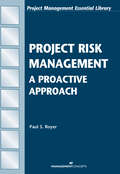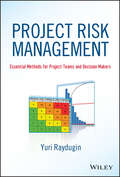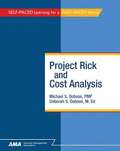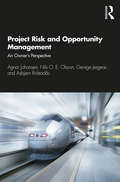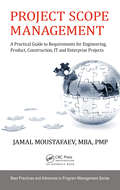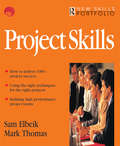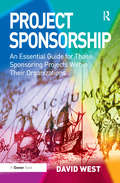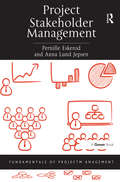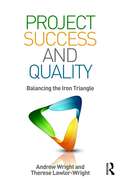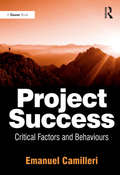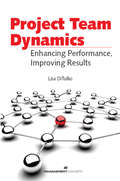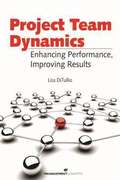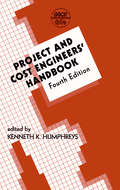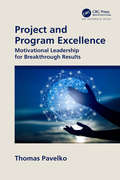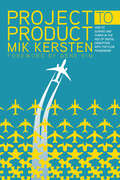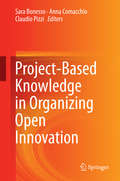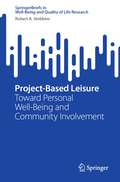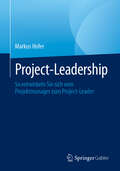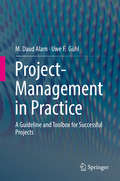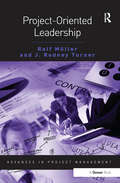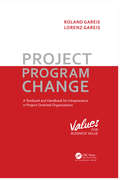- Table View
- List View
Project Risk Management: A Proactive Approach
by Paul S. Royer PMPYou don't need sophisticated statistical analysis or software to improve the probability of project success. This book offers a proactive project management process for managing project risk from project initiation through planning, execution, control and closure. In addition, you'll apply a new technique for program risk auditing that lets you explore risk in multiple related projects. You'll learn how to uncover hidden risk during the planning phase and how to track and manage it throughout the project. You'll also learn to enhance project value by building a risk management repository to support ongoing knowledge transfer.
Project Risk Management: Essential Methods for Project Teams and Decision Makers (Wiley Corporate F&A)
by Yuri RayduginAn easy to implement, practical, and proven risk management methodology for project managers and decision makers Drawing from the author's work with several major and mega capital projects for Royal Dutch Shell, TransCanada Pipelines, TransAlta, Access Pipeline, MEG Energy, and SNC-Lavalin, Project Risk Management: Essential Methods for Project Teams and Decision Makers reveals how to implement a consistent application of risk methods, including probabilistic methods. It is based on proven training materials, models, and tools developed by the author to make risk management plans accessible and easily implemented. Written by an experienced risk management professional Reveals essential risk management methods for project teams and decision makers Packed with training materials, models, and tools for project management professionals Risk Management has been identified as one of the nine content areas for Project Management Professional (PMP®) certification. Yet, it remains an area that can get bogged down in the real world of project management. Practical and clearly written, Project Risk Management: Essential Methods for Project Teams and Decision Makers equips project managers and decision makers with a practical understanding of the basics of risk management as they apply to project management. (PMP and Project Management Professional are registered marks of the Project Management Institute, Inc.)
Project Risk and Cost Analysis
by Michael S. Dobson Deborah S. DobsonProject Risk and Cost Analysis focuses on risk in the context of project management, primarily in the area of risk’s effects on project costs, with emphasis on the many modern tools that help you and your organization quantify and manage project risk. You will learn how to perform a formal risk and cost analysis, apply the Earned Value Method to risk management, and adjust schedule and budget reserves appropriately for your project conditions. The book follows the basic project risk management approach as laid out in A Guide to the Project Management Body of Knowledge (PMBOK® Guide), 4th Edition, popularly known as the PMBOK® Guide, along with other sources listed in the bibliography and suggested reading. This is an ebook version of the AMA Self-Study course. If you want to take the course for credit you need to either purchase a hard copy of the course through amaselfstudy.org or purchase an online version of the course through www.flexstudy.com.
Project Risk and Opportunity Management: The Owner's Perspective
by Asbjørn Rolstadås Agnar Johansen Nils O. Olsson George JergeasEffective risk and opportunity management is key to the successful delivery of any major engineering and construction project. This book looks at how all those involved can manage risk and capitalise on the opportunities that uncertainty present. The authors of this book highlight that uncertainties should be managed rather than avoided. This book will look at simple projects with a small team, to megaprojects where some hundreds of people are involved, and the consequences of delays or unforeseen costs. However, while the obvious risks can be planned for, the authors argue that it is often the opportunities in these situations that can have unexploited potential. This book is about opportunity management seen from the owner’s perspective. It will be an invaluable resource for those studying Engineering both undergraduate and postgraduate and set out ways in which projects should be managed from planning to completion. This book is also a great tool for those working in project management and the construction industry. While there are many books that demonstrate effective construction management, this book is the first of its kind to emphasise that there is opportunity in uncertainty, and possibility in the unexpected.
Project Scope Management: A Practical Guide to Requirements for Engineering, Product, Construction, IT and Enterprise Projects (Best Practices in Portfolio, Program, and Project Management #16)
by Jamal MoustafaevIncomplete or missed requirements, omissions, ambiguous product features, lack of user involvement, unrealistic customer expectations, and the proverbial scope creep can result in cost overruns, missed deadlines, poor product quality, and can very well ruin a project. This book explains how to elicit, document, and manage requirements to control project scope creep. It also describes how to manage project stakeholders to minimize the risk of an ever-growing list of user requirements. The book examines five different projects and traces their development from a project scope management perspective.
Project Skills (Industrial Society New Skills Portfolio Ser.)
by Mark Thomas Sam ElbeikProject Skills describes the best of the accepted project management techniques, taking the guesswork out of deciding which ones to apply at which stage. The subject of project management has developed over the ages into a fairly precise set of techniques, definitions and practices that are applicable to running projects. More and more projects are being handled by non-specialist project managers. Elbeik and Thomas present a practical and accessible guide to managing projects of all sizes, not just large scale ones.It also presents essential 'people' skills that are vital to making a project succeed. These include leadership skills, motivating others to deliver, communicating, holding meetings and how to manage change.The New Skills Portfolio is a groundbreaking new series, published in association with the Industrial Society, which re-defines the core management skills managers and team leaders need to be competitive. Each title is action-focused blending 20th century management initiatives/trends with a new flexible skills portfolio for managers constantly experiencing and managing organizational and marketplace change.The Industrial Society is one of the largest public training providers in the UK. It has over 10,000 corporate members.
Project Sponsorship: An Essential Guide for Those Sponsoring Projects Within Their Organizations
by David WestThe role of project sponsor is critical in large projects during the development of the business case, for governance and assurance and as the person who decides that the project should continue or close at any stage. Yet in many organizations the skills of the sponsor are often assumed; he or she will be a senior manager who may well have no practical project experience at all. David West explains the roles and skills that lie at the heart of effective sponsorship. The sponsor acts as a lynch-pin between the Board and the Project Manager, communicating and translating requirements downwards and resource needs, progress and constraints back upwards. An over-zealous sponsor may be tempted to assume some of the project manager's responsibilities, whilst an ineffective sponsor may be invisible, leaving the project manager uninformed by, and unrepresented to, the Board. Project Sponsorship includes exercises, examples and case histories from the real world of projects. It is an essential guide for anyone assuming the important role of managing the business case of the project and will help you ensure that the organization is 'doing the right things' as well as 'doing things right'.
Project Stakeholder Management: Project Stakeholder Management (Fundamentals of Project Management)
by Pernille Eskerod Anna Lund JepsenCarrying out a project as planned is not a guarantee for success. Projects may fail because project management does not take the requirements, wishes and concerns of stakeholders sufficiently into account. Projects can only be successful through contributions from stakeholders. And it is the stakeholders that evaluate whether they find the project successful - an evaluation based on criteria that go beyond receiving the project deliverables. More often than not, the criteria are implicit and change during the project course. This is an enormous challenge for project managers. The route to better projects, say Pernille Eskerod and Anna Lund Jepsen, lies in finding ways to improve project stakeholder management. To manage stakeholders effectively, you need to know your stakeholders, their behaviours and attitudes towards the project. The authors give guidance on how to adopt an analytical and structured approach; how to document, store and retrieve your knowledge; how to plan your stakeholder interactions in advance; and how to make your plans explicit, at the very least internally. A well-conceived plan can prevent you from being carried away in the ’heat of the moment’ and help you spend your limited resources for stakeholder management in the best way. To make this plan, you need to agree on the objectives of your stakeholder strategy and ways to achieve them. Project Stakeholder Management offers tactics and tools founded on established marketing communications theory as well as strategic management for doing just that. This book is part of Gower’s Fundamentals of Project Management Series.
Project Success and Quality: Balancing the Iron Triangle
by Andrew Wright Therese Lawlor-WrightProjects are inherently risky, since they involve some level of uncertainty, doing something new in the target environment, but the percentage of projects seen as a success is still disappointingly low, especially for IT projects. The ‘Iron Triangle’ of time/cost/quality suggests that all three aspects are equal, but with quantitative methods for monitoring project performance, the focus is primarily on managing cost and time. This book seeks to redress the balance, explaining the rationale and benefits of focusing more on quality (fitness for purpose and conformance to requirements) before detailing a range of tools and techniques to support rebalancing the management of projects, programmes and portfolios. It shows how managing project quality actively can reduce costs through minimising wastage, and reduce delays through avoiding rework, leading to improved project success rates and customer satisfaction.
Project Success: Critical Factors and Behaviours
by Emanuel CamilleriThe issue of what defines project success (or failure) is complex and often elusive, and dependent on the perceptions of different stakeholders. In this enlightening book Emanuel Camilleri examines the key factors bearing on perceived success or failure. This book is not just about project management, it goes much deeper into the topic of project success by prescribing a project success framework. In chapters dedicated to factors such as leadership, teams, communication, information management and risk management, the author shines a light on the key behaviours in which project managers and others engage and how those behaviours predict success or failure. Practising project managers, project board members and sponsors, struggling to manage conflicting stakeholder expectations, complexity and ambiguity, will learn which factors are vital to determining successful outcomes. Finally, having highlighted the particular skills, abilities and attributes identified by the research, Dr Camilleri offers a diagnostic model for assessing an organization's preparedness for undertaking and successfully managing major projects. Project Success provides a valuable contribution to the literature on this subject, and its application delivers practical guidance that will be welcomed by project professionals at all levels.
Project Sun Devil and Project Paris
by Nori Gerardo LietzTony Lee is preparing to present a project to the invesment committee of Howard Street Capital. He will be recommending an investment in Project Sun Devil, a high-quality 225-unit student housing rental property near Tempe, Arizona. Tony Lee will compete for capital against the other project on the investment committee's agenda, Project Paris. Project Paris, a very different type of real estate transaction, is a hybrid mezzanine investment in the acquisition of a residential real estate services firm headquartered in France. The case provides overview of the two projects.
Project Team Dynamics: Enhancing Performance, Improving Results
by Lisa DiTullioGet to the Heart of Building Productive Project Teams!Companies that embrace the power of collaboration realize that the best way to solve complex problems is to build cohesive teams made up of members with different skills and expertise. Getting teams to work productively is at the heart of project management. Developing the structure for teams to work dynamically at a high level of efficiency and effectiveness is at the heart of this book.The author clearly outlines methods for creating and implementing a structure to deal with the inevitable difficulties that any team may encounter. With examples drawn from contemporary project management, she demonstrates the effectiveness of this straightforward approach and highlights the risks of not building a strong team culture.The author offers simple and proven techniques for:• Launching a team• Defining and clarifying the goals of the team• Implementing and reinforcing appropriate team behaviorsTo help ensure the delivery of on-time project objectives, the author also gives practical advice aimed at ensuring productive team meetings, encouraging information sharing, and moving the team toward solutions in the face of challenges and conflict.
Project Team Dynamics: Enhancing Performance, Improving Results
by Lisa DitullioWhen companies embrace the power of collaboration it becomes clear that complex problems can be solved when a group of people with different skills and expertise work together as a cohesive and productive team. Getting teams to work productively is central to good project management. This book takes you through creating the structure and implementing the techniques you will need to ensure that such teams work as efficiently and effectively as possible. Project Team Dynamics clearly outlines methods for launching and developing a team and creating a framework to deal with the inevitable difficulties that any team will encounter. Author Lisa DiTullio uses examples from contemporary project management to demonstrate the success of these straightforward and adaptable techniques and also to show the associated dangers of not building a strong team culture.
Project Titan at Northrop Grumman
by C. Fritz Foley Kevin SharerIn March of 2011, Northrop Grumman divested shipbuilding assets through the spin-off of Huntington Ingalls Industries. This case reviews many of the key questions faced by Northrop's CEO, CFO, and top management team during this process, including questions concerning whether to sell or spin-off the assets; how to handle customers, employees, and investors during the restructuring; and how to reorganize a diversified business to increase the performance of its parts.
Project Valuation in Emerging Markets
by Robert E. KennedyReviews the issues managers face when attempting to value projects abroad. These include dealing with multiple currencies, adjusting for country and industry risk, and considering expropriation and devaluation risk.
Project and Cost Engineers' Handbook (Cost Engineering)
by Kenneth K. HumphreysMaking the specifics of a complex concern accessible and its handling quite manageable, this fourth edition of the Project and Cost Engineers' Handbook examines the variables associated with international projects and project risk analysis. It provides instruction on contingency planning, delves into ethical considerations, considers the imp
Project and Program Excellence: Motivational Leadership for Breakthrough Results
by Thomas PavelkoThis book provides insight, measures, and tools to manage a program or project to be first place amongst its competitors and similar efforts. Providing breakthrough insight by showing how to understand and use team member motivation, it gives leadership and team members the tools to be first place. It shows program and project managers how to motivate a team to perform better than its competitors while bringing great satisfaction and tailored growth to the team individuals. Highlights include: Selecting excellent task leads and determining the best team mix Fulfilling motivation needs during program and project execution Motivating high-tempo performance The very best performance of a program or project team occurs when the needs driving the fundamental motivations of team members are being met. This book explains how human motivation analysis substantiates the successful program and project, organizational and process elements that have been applied. By using the measure of providing promised deliverables within cost and schedule constraints and with managed risk, it describes team performance and explains the difference between a high-performance team and an average-performance one. It applies recent research of how motivation applies to programs and projects and how to accordingly organize a team. Beginning with an introduction of improvement concepts, this book reviews current program and project success statistics and then delves into how to reap the tremendous advantages of modern motivation-based organization leadership. It shows how to determine team member motivation and use it to assemble and execute a first-place program or project. Guidance includes showing how to assign the best mix of motivational types for each team and choosing leadership. Project and Program Excellence: Motivational Leadership for Breakthrough Results offers an organizational and leadership approach for highly successful development efforts.
Project and Program Turnaround (Best Practices in Portfolio, Program, and Project Management)
by Thomas PavelkoThe U.S. economy thrives on the development of new products, new systems, and new processes. Usually, these advances start as a flash of inspiration by highly creative individuals. It is complex and difficult to go from initial inspiration to a final product, process, or system. So it is not surprising that approximately one out of every four development programs fails. A development program or project in trouble is distinct from a program encountering typical development difficulties. Such a program or project can appear to be in free fall. This book identifies the essential fundamentals for executing a program or project turnaround effectively. These fundamentals include: Clearly identifying the next critical accomplishment needed for success Assigning responsibility for each program task to one person Capitalizing on colocation and face-to-face communication Recruiting problem solvers Wining commitment from team members Using team accomplishments to propel high team morale The guidance provided in this book is applicable to all program or project genres, including manufacturing, nonprofit work, education, medicine, investment management, and municipal management. Software has become a great part of both providing product functionality and assisting with managing product development. A special chapter devoted to software development dispels common misconceptions and provides guidance for turning around this special type of project or program. This book is a highly valuable source of insight for a wide range of readers, including management professionals, business students, and executive managers. Every member of a product or project development team will find its recommendations to be of high value.
Project to Product: How to Survive and Thrive in the Age of Digital Disruption with the Flow Framework
by Mik KerstenAs tech giants and startups disrupt every market, those who master large-scale software delivery will define the economic landscape of the 21st century, just as the masters of mass production defined the landscape in the 20th. Unfortunately, business and technology leaders are woefully ill-equipped to solve the problems posed by digital transformation. At the current rate of disruption, half of S&P 500 companies will be replaced in the next ten years. A new approach is needed.In Project to Product, Value Stream Network pioneer and technology business leader Dr. Mik Kersten introduces the Flow Framework—a new way of seeing, measuring, and managing software delivery. The Flow Framework will enable your company&’s evolution from project-oriented dinosaur to product-centric innovator that thrives in the Age of Software. If you&’re driving your organization&’s transformation at any level, this is the book for you.
Project-Based Knowledge in Organizing Open Innovation
by Sara Bonesso Anna Comacchio Claudio PizziEnriching understanding of the current theoretical debate on project-based learning and R&D sourcing, 'Project-based Knowledge in Organizing Open Innovation' draws on innovation literature and knowledge-based perspectives to solve open problems in the relationship between knowledge development at project level and how firms organize product innovation combining in-house R&D activities with inbound open innovation. Through field research in different industrial settings (pharmaceutical, automotive and machine tools) and with complementary methodological approaches, this book provides empirical evidence on how project knowledge features affect sourcing decisions at firm level. Due to the emerging interest in the management literature on project-based organizations and on the relevance of project forms of organizing in a knowledge-based economy, this volume will appeal to scholars and students in business and management, in particular those in innovation management, organization theory and strategic management. Addressing the still open issue of how the firm level should be complemented by studies at the project level of analysis, this book provides theoretical and empirical arguments on the advantages of a more fine-grained level of analysis to understand how firms organize their innovation processes across boundaries.
Project-Based Leisure: Toward Personal Well-Being and Community Involvement (SpringerBriefs in Well-Being and Quality of Life Research)
by Robert A. StebbinsThis short book discusses the relatively new concept of project-based leisure in leisure research, and relates it to individual and community well-being and quality of life. The book defines PBL as a short-term, reasonably complicated, one-off or occasional, though infrequent, creative undertaking carried out in free time, or time free of disagreeable obligation. Such leisure requires considerable planning, effort, and sometimes skill or knowledge. The book discusses how PBL contributes to subjective well-being, though doing so more modestly than serious leisure and occupational devotion. The book surveys existing field research of the author’s own and other studies, and provides original insights on how PBL activities can be used to generate community involvement and subjective well-being.
Project-Leadership: So entwickeln Sie sich vom Projektmanager zum Project-Leader
by Markus HoferProjekte sind heute komplexer denn je. Reines Projektmanagement ist hier längst nicht mehr ausreichend. Statt Methoden, Checklisten und Tools wird heute durch effektives Leadership in Projekten entschieden, ob diese ein Erfolg sind. Projektmanager müssen sich zu herausragenden Führungskräften entwickeln, um ihre interdisziplinären Teams, meist ohne direkte Führungsverantwortung in der Linie, zu führen. Dieses praxisorientierte Buch zeigt Ihnen den Weg, wie Sie sich vom Projektmanager zu einem echten Project-Leader entwickeln. Lernen Sie, wie Sie Ihre Teams durch Vision, Kultur und emotionale Intelligenz zu Höchstleistungen führen und auch in Krisenzeiten den Überblick behalten. Sie erfahren, wie Sie die richtigen Leadership-Kompetenzen aufbauen, um Projekte nicht nur erfolgreich abzuschließen, sondern zu übertreffen. Durch zahlreiche Praxisbeispiele und sofort umsetzbare Techniken bietet dieses Fachbuch einen klaren Fahrplan zur Transformation vom Projektmanager zum Project-Leader. Werden Sie der Project-Leader, den Ihr Team braucht. Inspirieren Sie andere durch Ihre Projekt-Vision und schaffen Sie eine Kultur des Erfolgs. Der Inhalt Die Rolle von Leadership in Projekten Der Project-Leader: Rollen, Kompetenzen, Projektorganisation, Agilität, Mindset, Lead by Example, Coaching Die 5 Faktoren für herausragendes Leadership: Projekt-Vision, Kultur, High-Perfomance-Teams, Teamführung, Selbstführung Projektorientierte Unternehmen Zahlreiche Praxisbeispiele und Interviews mit Experten Mit Online-Inhalten, Self-Assessment und Vorlagen
Project-Management in Practice
by M. Daud Alam Uwe F. GühlThis practice-oriented book explores a variety of cross-project topics and specific aspects of different project phases. It also offers tips, examples, templates and checklists, and discusses concrete problems and solutions from project practice in IT and the automotive industry. The authors combine their extensive practical experience in years of project work with relevant project-management theory. Each chapter begins with a list of the learning objectives and concludes with a summary of the insights provided. Accordingly, the book offers a valuable resource for: Beginners wishing to acquire basic project management skills Participants in more advanced project management training who are looking for instructional material Project management experts who want to learn about further aspects, and to employ templates and checklists for even more successful projects
Project-Oriented Leadership (Advances in Project Management)
by Ralf Muller J Rodney TurnerFrom the perspective of delivering successful projects, the value of a skilled project sponsor and project manager outweighs many other factors. Projects need leaders who can give them vision, identity, keep the stakeholders and the project team on board and make the difficult decisions that will enable the project to continue (or, if necessary, be terminated). These are human skills that don't necessarily feature large in the project management bodies of knowledge. Ralf Müller and Rodney Turner's Project-Oriented Leadership explains the key leadership models of managerial, intellectual and emotional leadership and shows how they can be applied within projects to lead processes, functions and people, and ensure an ethical and inclusive approach within projects and programs.
Project. Program. Change
by Roland Gareis Lorenz GareisThis book gives managers an integrative approach to project, program, and change management. It describes the differences between change in projects versus programs with case studies in both areas and the different life cycles. While the project and change comprise much of the book, it is up to date with its emphasis on agile, scrum, and benefits. The book also describes methods to both initiate and manage a change and what must be done for success and business value.
